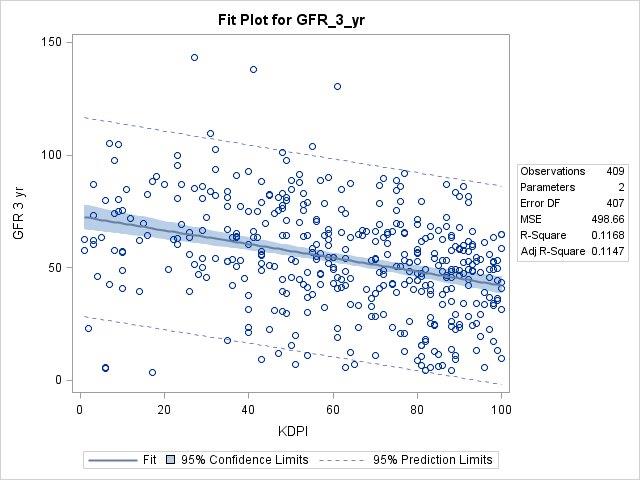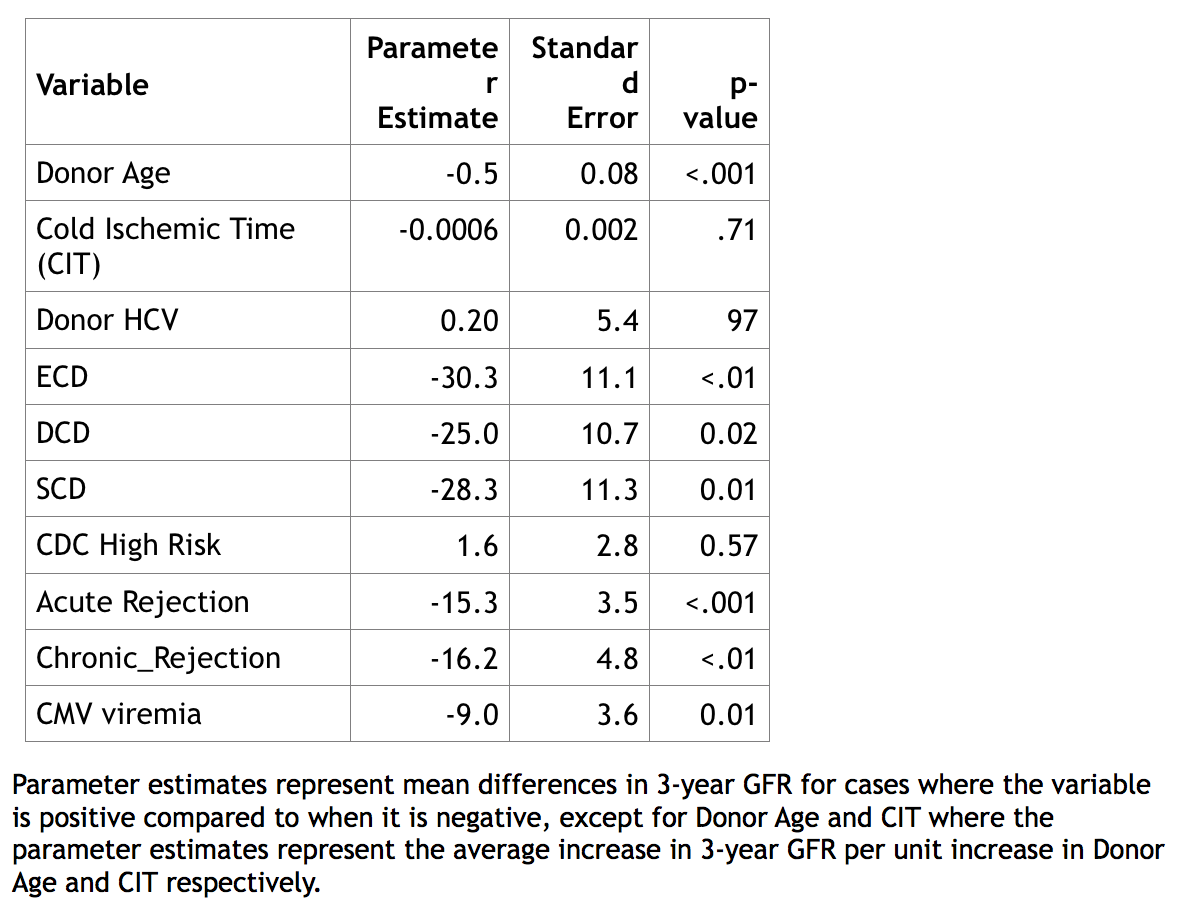Predictors of Glomerular Filtration Rate after Renal Transplantation
Montefiore Medical Center, Bronx, NY
Meeting: 2019 American Transplant Congress
Abstract number: B131
Keywords: Glomerular filtration rate (GFR), Hepatitis C, Kidney transplantation, Prediction models
Session Information
Session Name: Poster Session B: Kidney Donor Selection / Management Issues
Session Type: Poster Session
Date: Sunday, June 2, 2019
Session Time: 6:00pm-7:00pm
 Presentation Time: 6:00pm-7:00pm
Presentation Time: 6:00pm-7:00pm
Location: Hall C & D
*Purpose: Glomerular filtration rate (GFR) is an excellent indicator of renal function however there is limited data on the impact of KDPI on long term GFR after renal transplantation. The aim is to investigate if KDPI and other donor and recipient factors are predictive of long term GFR after renal transplantation.
*Methods: Adult deceased donor renal transplants performed at our institution between 2009-2014 were reviewed Donor characteristics included KDPI categorized as low (<20%) medium (20-85%) or high (>85%); age; graft type: extended criteria (ECD), cardiac death (DCD), standard criteria (SCD), CDC high risk; HCV status; and cold ischemic time (CIT). Recipient factors were age at transplant, induction agent, BK and CMV status and rejection. Primary outcome was 3-year GFR calculated by MDRD equation. End point was assessed with using linear regression rank-based tests in which death and graft failure were categorized as the lowest ranks.
*Results: 451 adult deceased-donor transplants were performed.Mean recipient age was 56±12.8 and mean donor age was 47±16. Mean KDPI was 63.0±26.4. Allograft types were as follows: ECD 147 (33%), DCD 55 (12%), SCD 253 (56%), HCV 19 (4%), CDC high risk 85 (19%). Mean CIT was 1610±690 min. Thymoglobulin was used in 58% of the patients. Patient and graft survival was 92% and 90%, respectively. Acute rejection was 12%, chronic rejection was 5%, CMV viremia was 11%, and BK viremia was 22%. Mean GFR at 3 years was 53.7±23.7. Higher KDPI was significantly associated with lower 3-year GFRs (p<.01) both as a categorical and continuous variable (Figure 1). Using univariate analysis, donor age, ECD/SCD graft, CDC high risk, recipient CMV, acute and chronic rejection were also significantly associated (p<.05) with 3-year GFR. In multivariate analysis, donor age, acute and chronic rejection, ECD, CMV viremia, SCD, DCD were significant in descending order of importance.
*Conclusions: Based upon our data, higher KDPI is predictive of lower GFR at 3 years. However HCV, a component of KDPI, is not. Donor age, acute and chronic rejection, ECD, CMV viremia, SCD, DCD (in descending order of importance) are independent predictors of 3-year GFR. Using additional donor and recipient factors more precise outcome prediction models may be created.
To cite this abstract in AMA style:
Andacoglu O, Dong Y, Liu J, Parides M, Rocca J, Graham J, Ajaimy M, Azzi Y, Pynadath C, Liriano-Ward L, Kinkhabwala M, Akalin E, Greenstein S. Predictors of Glomerular Filtration Rate after Renal Transplantation [abstract]. Am J Transplant. 2019; 19 (suppl 3). https://atcmeetingabstracts.com/abstract/predictors-of-glomerular-filtration-rate-after-renal-transplantation/. Accessed July 18, 2025.« Back to 2019 American Transplant Congress


